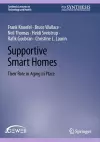
Supportive Smart Homes
6 authors - Hardback
£49.99
Dr. Frank Knoefel is a Physician at the Bruyère Memory Program, Ottawa, ON, Canada, a Senior Investigator with the Bruyère Research Institute, and an Affiliate Researcher with Carleton University. He obtained his MD at l’Université de Montréal, Family Medicine at l’Université de Sherbrooke, and his Fellowship in Care of the Elderly at the University of Ottawa. In addition to his appointment as an Associate Professor with University of Ottawa’s Faculty of Medicine, he is also an Adjunct Research Professor in Systems and Computer Engineering at Carleton University. His research expertise is in the use of sensors and data analytics to facilitate aging in place, initially focusing on mobility, and more recently working on cognition. Currently he is working on sensor applications for cognition both in smart supportive homes and driving simulators. He holds a Master of Public Administration and a Fellowship and Diploma in Care of the Elderly with the College of Family Physicians of Canada. Recently he was appointed as University of Ottawa Brain and Mind - Bruyère Research Institute Chair in Primary Health Care Dementia Research. In his spare time, Frank enjoys spending time with his family: snowboarding, sailing, photography, music, and amateur construction.
Bruce Wallace is Executive Director of AGE-WELL Sensors and Analytics for Monitoring Mobility and Memory National Innovation Hub (SAM3), Adjunct Research Professor with the Systems and Computer Engineering Department, Carleton University, Ottawa, ON, Canada and an Affiliated Researcher with the Bruyère Research Institute. He holds a Master and PhD in Engineering from Carleton University and has studied business at MIT Sloan and UNC Kenan-Flagler. With over 20 years of experience in the high technology sector, his current research interests include the application of sensors, signal processing, and big data analytics—especially as applied to cognition measurement witha specific focus on aging and independence. His work includes applications within personal residences, personal vehicles, hospitals, and other care settings. He is a Senior Member of the IEEE. Outside of work his interests include swimming, canoeing, music, and distance cycling.
Dr. Neil Thomas is a Cognitive and Behavioral Neurologist at the Bruyère Memory Program, an Assistant Professor of Neurology, Department of Medicine, University of Ottawa and an Affiliate Investigator, Bruyère Research Institute in Ottawa, Ontario, Canada. He holds a Master of Science in Neuroscience from Queen’s University. He completed his MD and neurology residency training at the University of Ottawa, and a Fellowship in Geriatric Neurology at the Oregon Health and Science University. His research focus is on using digital biomarkers to objectively measure and quantify changes in cognition and functional activities in individuals with cognitive impairment. He is also interested inimproving the assessment of time and effort spent on caregiving tasks using sensor-based objective outcome measures. He is a member of the American Academy of Neurology, the International Society to Advance Alzheimer Research and Treatment, the AGE-WELL National Innovation Hub in Sensors and Analytics for Monitoring Mobility and Memory, and the Consortium of Canadian Centres for Clinical Cognitive Research. He enjoys spending time with his wife and children, especially at the family cottage, kayaking, and skiing.
Heidi Sveistrup is a Full Professor in the School of Rehabilitation Sciences, Faculty of Health Sciences, at the University of Ottawa and an Adjunct Research Professor in the Department of Systems and Computer Engineering at Carleton University. She received her Master of Arts in Biomechanics from McGill University, and her PhD in Neuroscience from the University of Oregon. Her research focuses on rehabilitation and the use of technologies to support wellness, engagement, and long life. At the time of the writing of the book she was CEO and Chief Scientific Officer of the Bruyère Research Institute, and VP, Research and Academic Affairs at Bruyère Continuing Care, and the academic lead of the Ontario Centres Learning, Research and Innovation in Long-Term Care at Bruyère. She is a project lead and scientist with AGE-WELL, a senior investigator with the Bruyère Research Institute and continues to work with the CAN Health Network. Heidi has contributed to the advisory and scientific councils of the University of Ottawa's Brain and Mind Research Institute, the Canadian Accessibility Network, and the Canadian Standards Association work on long-term care standards. When not working, Heidi enjoys reading, boating and time with family.
Rafik Goubran is Vice-President (Research and International) and Chancellor’s Professor at Carleton University, Ottawa, ON, Canada. He received his PhD in electrical engineering fromCarleton University in 1987. His research expertise is on sensor applications, data analytics, and audio signal processing. His current research projects focus on patient monitoring and the design of smart homes for the independent living of seniors. He served as Dean of the Faculty of Engineering and Design and Chair of the Department of Systems and Computer Engineering at Carleton University and was founding Director of the Ottawa-Carleton Institute for Biomedical Engineering. Rafik is a Life Fellow of the IEEE, a Fellow of the Canadian Academy of Engineering, a member of the Association of Professional Engineers of Ontario, and an Affiliate Investigator with the Bruyère Research Institute.
Christine L. Laurin holds a Master of Arts Communication from the University of Ottawa and Masters Certificate in Project Management from Carleton University and the Schulich School of Business at York University. After 16 years in Ottawa’s high-tech sector, Christine joined the Medical Affairs team at Elisabeth-Bruyère Hospital, Ottawa, ON, Canada to support physicians with the Bruyère Memory Program. As a Research Coordinator with the Bruyère Research Institute, she also supports AGE-WELL National Innovation Hub on Sensors and Analytics to Measure Mobility and Memory (SAM3) as their Coordinator of Knowledge Translation. She is interested in how visual texts help us to communicate and comprehend, and how these then contribute to a ‘distribution of the sensible’. Christine, aka Teena, enjoys spending time with family and friends, hiking, gardening, painting, and laughing.